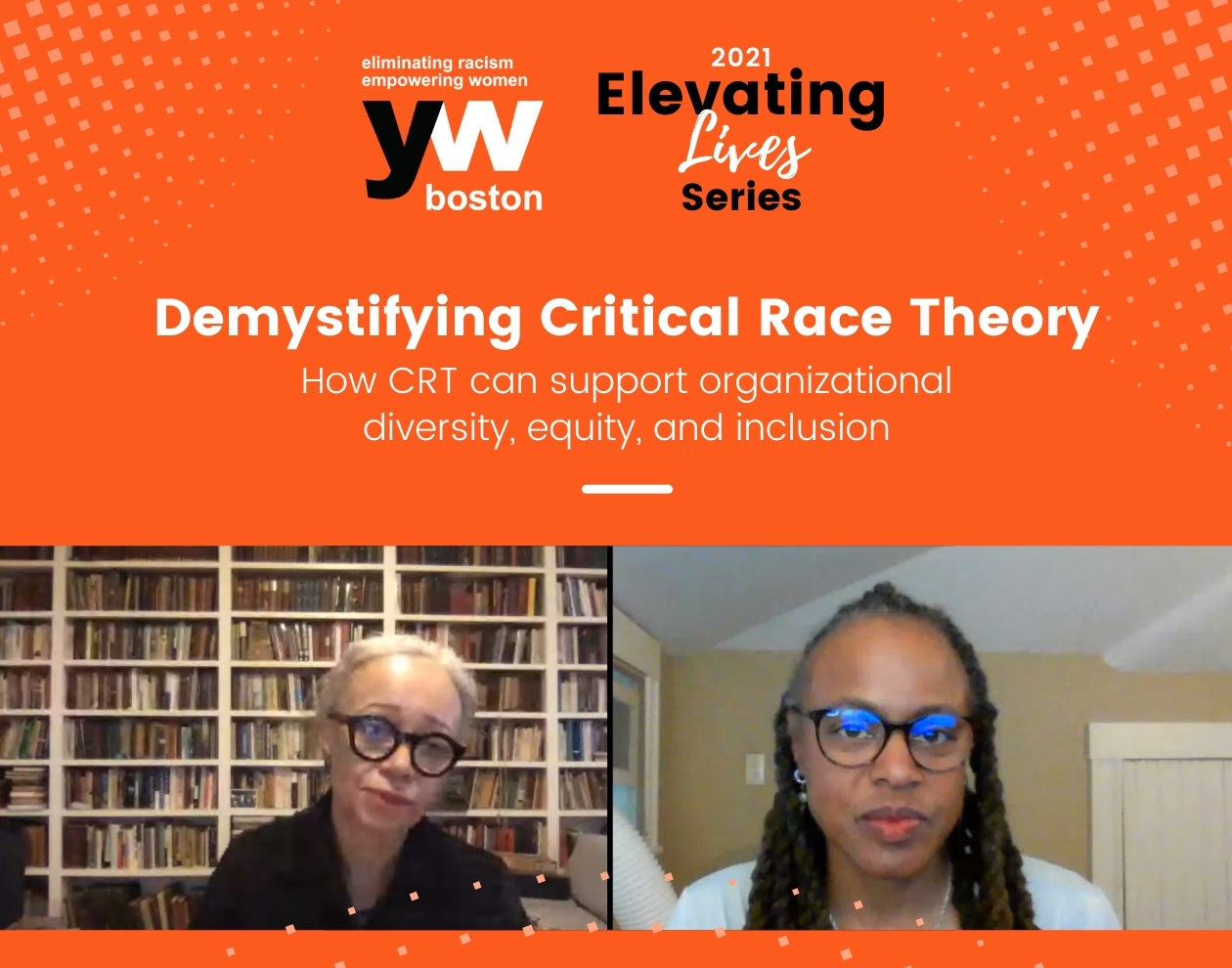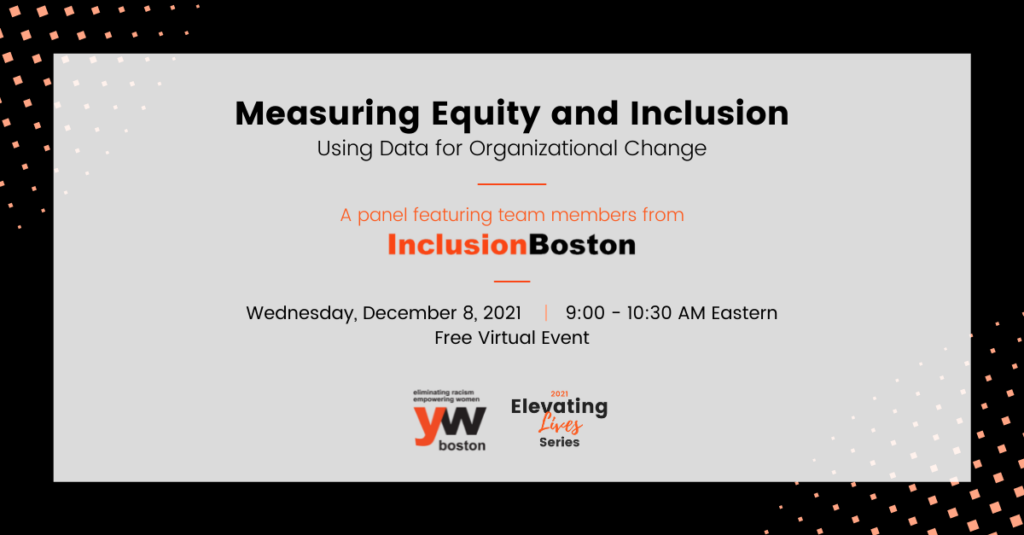
October 27, 2021
Demystifying Critical Race Theory: Our top five takeaways from the first Elevating Lives 2021 event
On October 26, 2021, YW Boston launched our virtual 2021 Elevating Lives Series with a program entitled Demystifying Critical Race Theory: How CRT can support organizational diversity, equity, and inclusion. We were joined by Patricia J. Williams, a University Professor of Law and Philosophy, and Director of Law, Technology and Ethics at Northeastern University. As a Critical Race Theory scholar, she has published widely in the areas of race, gender, and law.
Critical Race Theory was the buzzword of summer 2021. Much of its popularity has been driven by state legislators who have introduced, or passed, bills to ban Critical Race Theory from being taught in public schools. There are many popular misconceptions about CRT and its place in our schools, workplaces, and organizations. CRT is not a diversity and inclusion “training” but a practice of interrogating the role of race and racism in society. We hosted this event in order to gain a better understanding of Critical Race Theory and the role it can play in furthering our organizational diversity, equity, and inclusion (DEI) work.
Beth Chandler, YW Boston’s President & CEO, opened the event by welcoming the audience and providing context on YW Boston and Critical Race Theory. As she explained, “We want to equip you with the knowledge you need to approach conversations about Critical Race Theory with intention. Furthermore, increased understanding of Critical Race Theory will only deepen one’s grasp of the issues and causes of inequity, and lead to more impactful solutions to create more equitable work spaces.” She introduced Professor Williams who spoke about the current climate of fear surrounding Critical Race Theory before Beth rejoined for a conversation.
Elevating Lives 2021 is our fall event series featuring two virtual events focused on our work to create more inclusive spaces in Boston and beyond. Thank you to all who made our first event possible, including our sponsors, speakers, and attendees. We invite our community to learn more by viewing a recording of our event, as well as our top takeaways, below.
Captions are available for this video. To activate closed captioning, please start the video and select the icon labeled “CC” at the bottom-right corner.
Key Takeaways from Demystifying Critical Race Theory: How CRT can support organizational diversity, equity, and inclusion
We need to get on the same page about what Critical Race Theory is and isn’t.
During summer 2021, Critical Race Theory became a flashpoint for debates about whether histories of racism should be taught in schools. As Beth explained in her opening remarks, “This term, which previously only meant anything to academics and racial justice professionals, had become the bogeyman–used to discount the efforts of schools and organizations seeking to become more inclusive and equitable.” It is a theory that emerged out of critical legal studies in the 1970s and 1980s that asserts that race plays a part in our society’s systems, such as our legal system and our education system. It is taught almost exclusively in graduate-level courses. But, this year, many Americans have fought against Critical Race Theory for fear it is being taught to their children and integrated into DEI programs.
As Professor Williams noted in her remarks, people are reacting to their own fear of talking about race and working to dismantle racism. She explains, “What they are fighting against is not Critical Race Theory, but integration.” They are fighting against their own discomfort, and the possibility that their children will “become upset about precisely the difficult dialogues that I think we must have.” In doing so, they have weakened institutions’ diversity, equity, and inclusion initiatives.
Beth explained that with this event, “We want to equip you with the knowledge you need to approach conversations about Critical Race Theory with intention.” You can learn more in our article, Beyond the buzzword: How can we use Critical Race Theory to further equity and inclusion work?.
By not holding conversations about race and racism, we are making them even more taboo in our society.
Beth acknowledged that, “It is difficult to look at this country’s history and to recognize that our institutions are embedded with inequities. But we have to work through this fear to make it to the other side….We all need to prepare ourselves to hold difficult conversations, especially with those we seek to make change with, such as our colleagues.“
Professor Williams explained that not providing the space or ability for young people to have these conversations engrains in them the belief that talking about racism is taboo. She read from her recent article “How NOT to Talk About Race,” stating “ignorance about race becomes a secret excitement; racial disparagement becomes an indulgent exercise, a species of cathartic emphasis, like swear words…discussion of race remains stunted and infantile, too much like assigning ‘cooties’—loosely undefined yet cruelly specific.” So, when a racist incident comes to light, the community is unable to take appropriate measures to address the harm and prevent it in the future. Simply talking about race is considered blasphemous.
In order to create space for understanding and action, we need to frame racism as a systemic issue.
One reason these conversations are so difficult is that the belief that racism is an individual issue. To many, conversations about racism or Critical Race Theory make them feel like they are being singled out as the singular racist. Professor Williams explains, “As adults, we are in a society that has a punitive history. We need to be able to confront this history without the framing as individual faults. Framing [these prejudices] as structural is essential.“
She continues, “It’s not your individual fault, necessarily. You may have done something, but I’m not talking about that individual level. You know, this analysis is about the fact that these legacies linger in ways of which we may be completely innocent and unconscious. But to recognize that if those structures continue to perpetuate those histories, then we don’t know each other. And we are afraid of each other. And we build walls at a moment when wall building is actually injuring us.” Critical Race Theory helps us understand racism as a systemic part of our institutions, which individuals take part in knowingly or unknowingly. Recognizing this fact will help us root out the racism in our institutions, with the goal of creating more equitable spaces and outcomes.
Cancel culture, a taunt, is not the same as censorship, a policy.
During the Q&A portion of the event, an attendee asked Professor Williams about the role of “cancel culture” in the fight for racial justice. Professor Williams stated she doesn’t like the term, viewing it as “a term specifically devised to disparage and to minimize, and to make fun of to mock the kinds of conversations that are difficult.” She recognized that in these conversations, people are often struggling with what to say, and that because of that, they are spaces where people can learn about race and racism and can grow. By dismissing interactions where people point out to others their opposing point of view as “cancel culture,” people are shying away from learning.
Professor Williams views this dismissive term, “cancel culture,” as different from the more pressing issue of censorship. The two terms are often conflated, but censorship refers to when the government silences you. So, when a city, state, or national government bans certain books or curriculums — such as teaching about racism — that is censorship. Professor Williams states, “people are dismissing [these laws], as you know, in an effort to control cancel culture…That’s ironic and upside down.”
Building the trust to hold difficult conversations will help us grow.
Professor Williams spoke about the importance of trust in holding authentic conversations. Truly listening to one another can result in participants gaining empathy and potentially changing their mind. She asked the audience to accept when people change their minds, and create space for this by building trust. Professor Williams is concerned that the heightened fear of conversations about race, such as parents’ worry about conversations in school, creates an environment where people are surveilling for wrongdoing — thereby preventing trustbuilding.
Her point is analogous to YW Boston’s DEI philosophy, where we view trust-building as a crucial first step in an organization’s DEI work. As Beth shared, “Here at YW Boston we recognize that active listening and relationship building are crucial components within organizations seeking to make positive change together. For instance, our InclusionBoston partnership equips organizations with the skills to navigate difficult conversations and embed DEI strategies into their DNA. By committing to continual learning and to community building, we bring more people into the work to create more equitable and inclusive spaces.“

Interested in learning more during our Elevating Lives 2021 series?
Please join YW Boston for the second installment of our 2021 Elevating Lives virtual event series, Measuring Equity and Inclusion: Using Data for Organizational Change. After learning how frameworks such as Critical Race Theory can help organizations better determine where to advance diversity, equity, and inclusion (DEI) work during our first Elevating Lives event, we will explore the importance of measuring behavioral change as a key indicator of successful equity and inclusion initiatives in the workplace. You will hear from our internal experts Dr. Anouska Bhattacharyya, Director of InclusionBoston, and Dr. Sarah Faude, Director of Research and Evaluation. Drawing from YW Boston’s unique approach and findings from our extensive DEI Services, we will explore the key drivers to behavioral change and how organizations can go about measuring new and existing workplace inclusion initiatives
Date: Wednesday, December 8, 2021
Time: 9:00AM – 10:30AM Eastern Time
___
About YW Boston
As the first YWCA in the nation, YW Boston has been at the forefront of advancing equity for over 150 years. Through our DE&I services—InclusionBoston and LeadBoston—as well as our advocacy work and F.Y.R.E. Initiative, we help individuals and organizations change policies, practices, attitudes, and behaviors with a goal of creating more inclusive environments where women, people of color, and especially women of color can succeed.
Whether your organization is large or small, you’re just starting out with DEI, or are further along on the journey, YW Boston will work with you to find the right solutions. YW Boston offers a variety of DEI Services designed to create lasting change. For more information, please contact Sheera Bornstein at sheera@ywboston.org.
About InclusionBoston
InclusionBoston advances diversity, equity, and inclusion by partnering with organizations looking for improved results. Using our advanced assessment tool and the latest research on behavioral and organizational change, we partner with organizations to create an action plan and provide them with the resources needed to drive lasting change. Our customized, evidence-based approach builds internal capacity and promotes cultural change while supporting organizations throughout their journey. YW Boston also offers one-day workshops where participants explore frameworks, develop knowledge, and engage in dialogue.
Ready to unlock the power of diversity in the workplace? Click here to learn more about InclusionBoston and request your free consultation.

